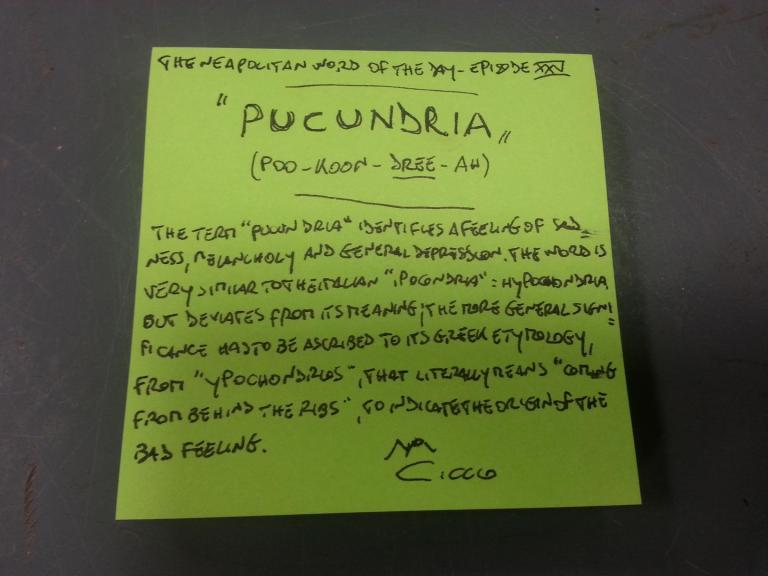Episode XXV
PUCUNDRIA
(poo – koon – DREE – ah)
The term “pucundria” identifies a feeling of sadness, melancholy and general depression. The word is very similar to the Italian “ipocondria” = hypochondria, but deviates from its meaning; the more general significance has to be ascribed to its Greek etymology, from ypochondrios, that literally means “coming from behind the ribs”, to indicate the origin of the bad feeling.
Neapolitans are an emotional lot. They are very sensible to their emotive status, and their behavious amplifies their feelings: if they’re pleased, they are explosive, dynamical, joyous and extrovert. On the contrary if, for some reason, the situation is not of their liking, they tend to get depressed and abated: the reasons for discomfort can be various, from a bad moment in their lives, to troubles at work, to bad weather (yes, Neapolitans are VERY meteoropathical), but they all result in the condition indicated by the word of the day, pucundria (often mangled into appucundria, deriving from ‘a pucundria, where the ‘a is simply the article of the word).
In many ways, this condition is very similar to the brazillian saudade: the pucundria is often paired to a sense of longing for a lost situation and, just like saudade, it is often experienced by Neapolitans living far from their homes, from their relatives, from Napoli. So if you know some Neapolitan who lives abroad (and I bet you know at least one 😉 ), and you see him a little bit depressed or sad, probabily he has some pucundria, longing for his home. Hug him, and comfort him.

Thank you for the information given on pucundria I found this word very interesting. I appreciate you have written it in english instead of italian otherwise I wouldn’t understand, yet 😀
I agree to the definition of saudade, I would just like to say that saudade is a feeling developed based on the happy and nostalgic moments that were spent together with the object that is missing, instead of feelings of sadness or grief.
About the ‘brazillian saudade’, brazillian is not a language. The language spoken in Brazil is portuguese.
Ciao 🙂
"Mi piace"Piace a 1 persona
Josè, I’m pleased to hear that you enjoyed this post. I always think about beginning again publishing here, but never seem to have the time 😀
By the way, I am aware that the language spoken in Brazil is portuguese (and I also know that brazillian are fierce and proud when it comes to their language!) (rightly so, if I may add): the text is rather unclear on this, but I wanted to refer to “the concept of ‘saudade’ as experienced by people living in Brazil” 😉
"Mi piace""Mi piace"
I am leaning more and more about Neapolitan culture, and I find the language more close to portuguese than italian is to portuguese. I hope you find the time to write more.
Ah I am happy that you know about this as many people don’t.
I am also aware that Neapolitan are very proud of their language and culture after coming across with only a few. But I am portuguese and you need to understand why is it matter: you’re a explaining a concept that no other language has a word with the exact same meaning, and your intention is to highlight a concept that brazillian people experience? You shouldn’t. You left out all the portuguese speaking countries that have the same word with the exact same meaning. It’s giving the word saudade a misleading meaning whereas we share the same cultural identity that is inherited from our language, not just by the brazillian country. If you were defining samba I would understand, but not this 🙂
You should highlight that it’s the portuguese saudade, regardless of the country as it’s a widely spoken word and not restricted to a local region.
"Mi piace""Mi piace"